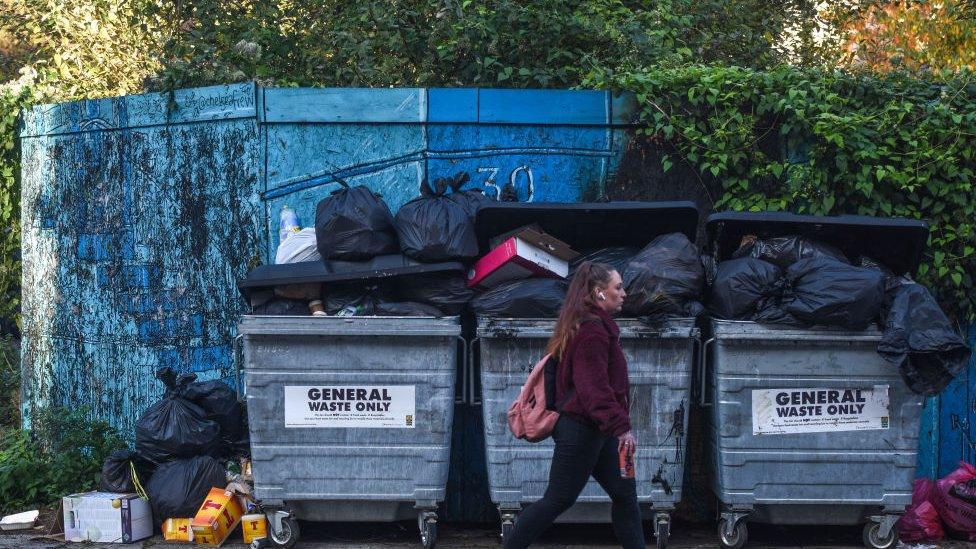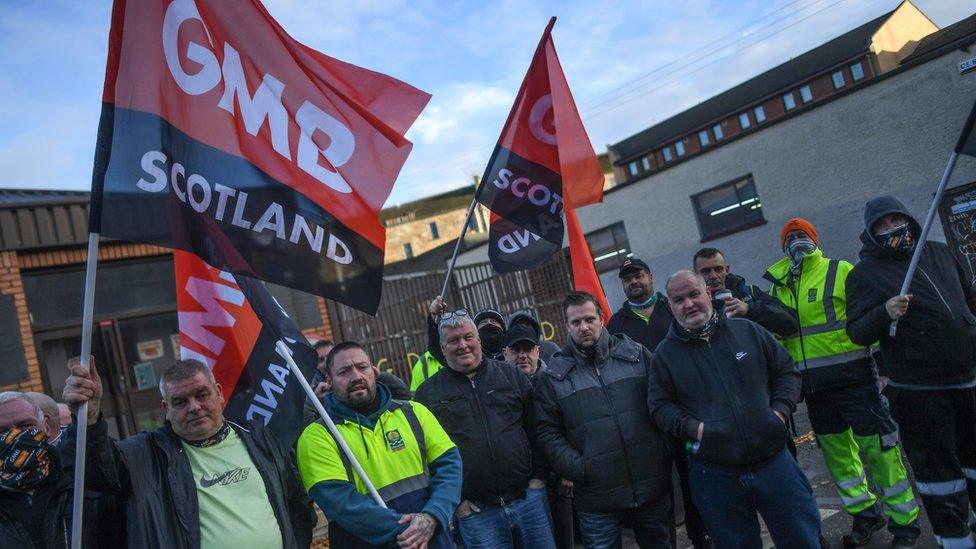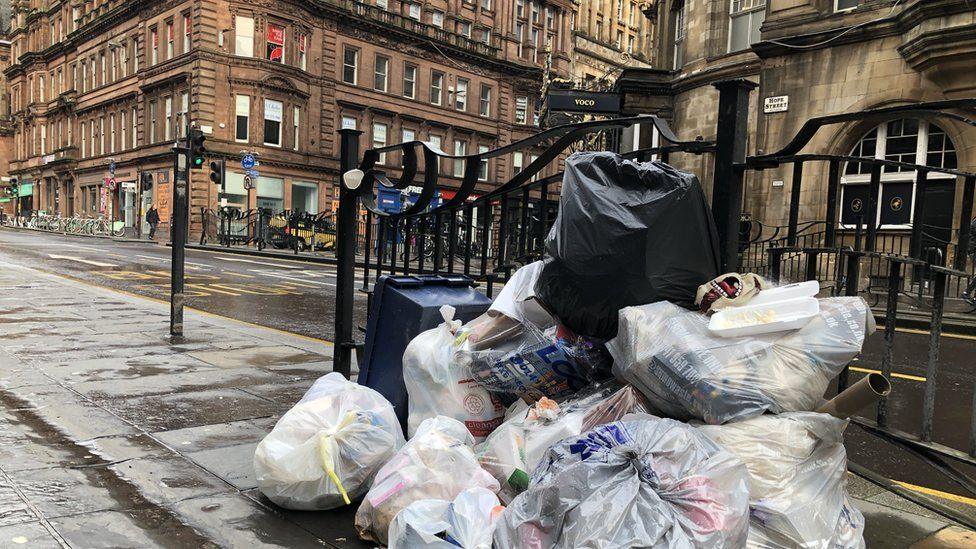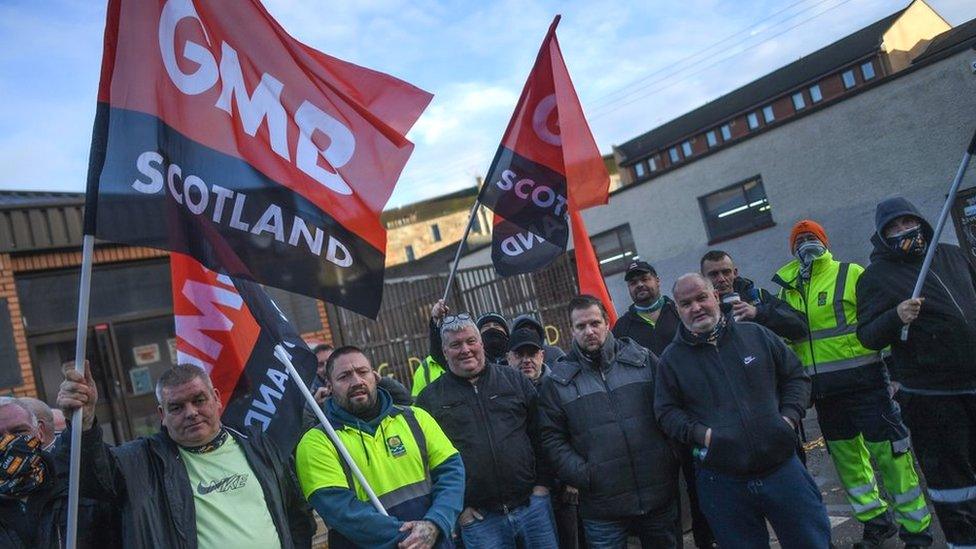Strike-threatened councils make new staff pay offer
- Published

Refuse workers are due to strike with dates due to be announced for school staff action
Scottish council leaders have made a new pay offer to staff in a bid to avoid planned strikes.
Cosla has put a 3.5% deal on the table after a 2% increase was rejected, and will raise the Scottish local government living wage to £10.50 an hour.
Unions said the offer was not enough.
Local government minister Shona Robison said it was "extremely disappointing" that Cosla had not come up with 5%.
The Scottish government has said it expected local authorities to match the £140m extra pledged by the Scottish government for pay rises.
Ms Robison said: "Cosla recognised this was not an issue for the Scottish government to solve in its entirety - it has got to be a partnership.
"Which means local authorities must look at every possible area of finance to come to a fair and affordable pay offer for staff which avoids damaging industrial action."
Earlier, GMB Scotland and Unison announced that local authority employees across the country would strike in two four-day stoppages over the next month in the ongoing pay dispute.
Waste and recycling workers will walk out between August 26 and 29 as well as between September 7 and 10.

Refuse workers in Glasgow last took strike action in November 2021
GMB members will strike in Aberdeen, Angus, Dundee, East Ayrshire, East Lothian, Falkirk, Glasgow, Inverclyde, Highland, Midlothian, Orkney, South Ayrshire, South Lanarkshire, West Lothian, Perth and Kinross, and North Lanarkshire.
Unison members in Aberdeenshire, Clackmannanshire, East Renfrewshire, Glasgow, Inverclyde, North Lanarkshire, Stirling and South Lanarkshire have also said they will walk out.
Following a special meeting of council leaders on Friday, Cosla spokeswoman Katie Hagmann said she had been mandated to make a fresh offer.
She said council leaders had reaffirmed their desire to make an offer of more than 2% but that fears had been expressed that public services and jobs would be affected as a result.
Ms Hagmann said: "Following the confirmation that the additional monies provided by the Scottish government will be recurring, leaders have now mandated me today to move forward with our trade union partners on the basis of an offer that raises the Scottish local government living wage to £10.50.
"Leaders note the risk that public services will not recover, jobs will be affected and communities will see services reduced as local government budgets are unable to sustain the long-term pressures they have been under.
"Leaders continue to call on Scottish government to provide funding and flexibilities to enable an offer beyond the monies provided to date.
"As such, we will be seeking to make an improved offer via the appropriate negotiating mechanisms as soon as possible."
'Strong financial settlement'
The Scottish government's finance secretary John Swinney had earlier urged councils to improve their offer to staff and unions.
Mr Swinney told BBC Radio's Good Morning Scotland programme he wanted to avoid industrial action.
He said some councils had already budgeted on a higher pay offer than the one on the table.
"Some have budgeted on 3% and have offered 2%. I have put £140m on table which puts the offer even higher," he said.


No council leader believes staff only deserve a 3.5% pay rise. The problem is what they can each afford.
Council pay is consistent across all 32 of Scotland's local authorities. The rise has to be affordable to all of them.
The Scottish government is giving councils an extra £140m To help with pay.
This was enough to raise the pay offer from 2% to 3.5% but the Scottish government was clear that councils had to use more of their own money too.
Some councils, including Glasgow, were prepared to do this. Glasgow had argued for a 5% pay rise.
Some others argued they could not afford any more so would need even more cash from the Scottish government.

Mr Swinney said that according to the Scottish Fiscal Commission, the Scottish government's overall budget was cut in real terms by the UK government and that within that budget, councils were given a "strong financial settlement".
The UK government says Scotland has been granted record funding levels.
Leader of East Renfrewshire Council, Owen O'Donnell, told BBC Scotland it would be difficult to avert strikes unless Mr Swinney offered more cash to councils to pay for salary rises.
He said: "He needs to double the amount he previously offered at least.
"Councils are under a huge amount of pressure. We have been squeezed for the past 15 years and we have got nothing else to give."
It comes a day after the Scottish government announced an emergency budget review for Scotland in response to the growing cost of living crisis.
'No suspension of strikes'
Johanna Baxter, Unison Scotland's head of local government said: "Unison are shocked and disappointed that Cosla leaders have yet again failed to come up with a decent pay offer for these vital workers.
"An offer of 3.5% is likely to be totally unacceptable to our reps and is some way off matching the offer made to council workers south of the border.
"Whilst our local government committee will meet next week to take a view on this there will be no suspension to our strike action at this stage."
GMB Scotland senior organiser Keir Greenaway said: "This is a dire response to the cost of living crisis facing our members.
"The blame game between Cosla and the government will no doubt continue, but six months on from the overwhelming rejection of the initial pay offer, this is a damning indictment of how our council workers are valued by Scotland's political leaders."
- Published10 August 2022

- Published5 August 2022

- Published3 August 2022
